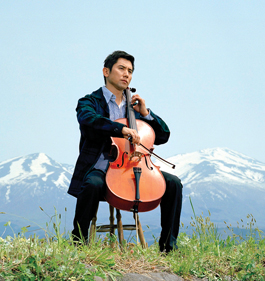home | north bay bohemian index | movies | current reviews | film review

RETUNED: Masahiro Motoki plays a cellist turned coffin man.
Coffin Job
'Departures' brilliantly hovers between comedy and tragedy
By Richard von Busack
The best comedies are always uncertain about what side of the line they fall on. Sometimes, a tragedy seems about to break out at any minute. Departures, the surprise best foreign film winner at this year's Oscars, proves that there's just as much potential for humor in a death comedy as there is in a sex comedy.
Departures begins with a kind of sketch: two men from the undertakers come to the "encoffining" of a beautiful girl. The ceremony is exquisitely solemn—corpse-arranging is yet another fine Japanese art—including cloth folding, cleaning and anointing. While sponging the body, Daigo (Masahiro Motoki), the younger of the two encoffiners, finds out that the deceased had an embarrassing secret, a debacle that he handles quickly.
He wasn't always that cool. In flashback, we learn that Daigo played the cello in a bad Tokyo orchestra. We see his performance of Beethoven's Ninth, performed for about a dozen grim-faced music fans. Laid off afterward, Daigo is in serious debt, since his expensive new cello set him back some $186,000. Without a better idea, Daigo decides to leave Tokyo to reclaim his family home in the country in Yamagata Prefecture. Daigo's adoring wife, Mika (Ryoko Hirosue), agrees to the plan, seemingly without doubts. Looking for a job, Daigo finds a newspaper ad for work helping out "Departures."
Sasaki (Tsutomu Yamazaki), the boss, looks Daigo up and down. "You're not depressing," he judges and tosses Daigo's résumé on the floor without reading it, hiring Daigo right on the spot. It turns out that the ad was a misprint. Daigo will be working not with departures but with the departed—this business sells and fills coffins. Though old Sasaki claims that fate sent the young man there, Daigo can't accept it. He hides his new job from his wife; when Mika finds out, she regards her husband as an untouchable and leaves him.
What follows are slices of life in the death trade. Daigo becomes aware that what had seemed like a job was actually a vocation. He's very good at handling the formalities and the harsh situations: untimely deaths, suicides by charcoal inhalation or the aftermath of a motorcycle crash. The long winters in Yamagata set the mood of mourning. If Daigo doesn't look depressing, he's serious enough for the occasions, and he has his own dark issues: Daigo's father left him and his mother when he was young.
Certainly, his new boss is a fine replacement for any lost dad. Sasaki is a man among men. Yamazaki, never to be forgotten as the John Wayne–like trucker in the 1985 Tampopo, is an actor of absolute gravity and unreal smoothness, and he gives a top movie star's performance in this role. Yamazaki's suaveness just gets richer as the film goes along.
To watch Sasaki at work is to sort of wish you were dead already. He has the aspect of a magician, explaining the steps to the mourners: "I will now affix the lid . . ." Likewise, he comes across like an alchemist, transforming a distinctly green corpse into the likeness of a sleeping, peaceful wife.
Yamagata Prefecture supposedly has a reputation as a region of bumpkins. It's easy on the eyes; the snow-covered volcanic cones and the wetlands make you think of Washington state. Maybe the earthiness of the people is a regional-comedy touch in all the characters, from the pastoral, tranquil Sasaki to his salty, forward secretary (Kimiko Yo, a pleasure to watch).
The laughter or family fights that break out at funerals might be part of this movie's rural, working-class eye. Departures is backward looking; it favors farmland and old-fashioned wood-fired bathhouses over the Tokyo mania. It celebrates old-style, hands-on craft.
Director Yojiro Takita has impeccable timing and a constant bubbliness. He expertly mixes what seems like unmixable material. In one moment, clouds of swans fly as Daigo practices his cello in the countryside; in an earlier scene, Daigo emits a Jimmy Stewart–style gobble of panic after Sasaki casts him as a model corpse for a training film. (Daigo is sort of a fussbudget; caught by his wife after having hidden the purchase of the cello, he dithers his hands—the cartoon gesture of a husband found out in a lie.)
Departures goes long. One perfect scene—a crematorium operator's tale of a Christmas Eve he once spent—goes on to explain itself, and spoils the mood. The reconciliation of Daigo to his father's memory stalls, even after it's clearly inevitable. Still, Departures is a movie about death that's suffused with the joy of living.
'Departures' opens on Friday, June 12, at the Rialto Lakeside Cinemas, 551 Summerfield Road, Santa Rosa. 707.525.4840.
Send a letter to the editor about this story.
|
|
|
|
|
|